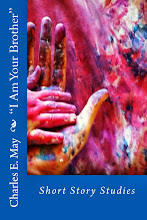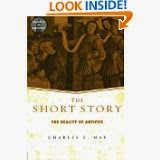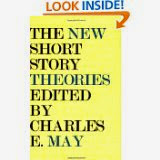Phil Klay's debut collection of stories about the Iraq War, Redeployment, won the National Book Award for 2014.
Short story collections don't often win the National Book Award. Since
the award began in 1950, only the following ten short fiction collections have
earned the prize:
1951: The Collected Stories of
William Faulkner by William
Faulkner
1959: The Magic Barrel by Bernard Malamud
1960: Goodbye, Columbus by Philip Roth
1966: The Collected Stories of Katherine
Anne Porter by Katherine
Anne Porter
1972: The Complete Stories of Flannery
O'Connor by Flannery
O'Connor
1973: Chimera by John Barth
1974: A Crown of
Feathers and Other Stories by
Isaac Bashevis Singer
1981: The Stories of John Cheever by John Cheever
1983: Collected Stories of Eudora Welty by Eudora Welty
1983: Collected Stories of Eudora Welty by Eudora Welty
1996: Ship Fever and Other Stories by Andrea Barrett
Here are the other nine books in the 2014
Longlist for Fiction:
Rabih Alameddine, An Unnecessary
Woman, Grove Press/ Grove/Atlantic
Molly Antopol, The UnAmericans,
W. W. Norton & Company
John Darnielle, Wolf in White
Van, Farrar, Straus and Giroux
Anthony Doerr, All the Light We
Cannot See, Scribner/ Simon & Schuster
Emily St. John Mandel, Station
Eleven, Alfred A. Knopf/ Random House
Elizabeth McCracken, Thunderstruck
& Other Stories, The Dial Press/ Random House
Richard Powers, Orfeo, W.W.
Norton & Company
Marilynne Robinson, Lila,
Farrar, Straus and Giroux
Jane Smiley, Some Luck, Alfred
A. Knopf/ Random House
Little wonder that newspaper reports of the Award Ceremonies in November
suggests that Klay (who is 30) seemed surprised that he had won.
Here are the fiction
judges for 2014:
Geraldine Brooks won the 2006 Pulitzer Prize for Fiction
for her novel, March. A former foreign correspondent, she has
reported from more than fifteen countries and wrote two works of nonfiction.
Sheryl Cotleur holds a B.A. from Case Western Reserve
University and an M.F.A. from Kent State University. She has been a bookseller
for the past 28 years and is currently the frontlist and backlist buyer for
Copperfield’s, a chain of seven stores in northern California.
Michael Gorra’s Portrait of a Novel: Henry James and
the Making of an American Masterpiece was a finalist for both the 2013
Pulitzer Prize and the National Book Critics Circle Award in Biography
Adam Johnson is the author of Emporium, a
story collection, and the novels Parasites Like Us and The
Orphan Master's Son, winner of the 2013 Pulitzer Prize.
Lily Tuck is the author of five novels, including The News
from Paraguay, winner of the 2004 National Book Award; two
collections of stories, Limbo, and Other Places I Have Lived and The
House at Belle Fontaine.
A judges' statement reads: "If all wars ultimately find their own
Homer, this brutal, piercing, sometimes darkly funny collection stakes Klay's
claim for consideration as the quintessential storyteller of America's Iraq
conflict."
Reviews of the book, which came out in March, were
mostly high praise. If characterizing
Klay as the new Homer doesn't impress you, Jeff Turrentine of The Washington Post said if you have been seeking the Tim O'Brien
or the Joseph Heller or the Erich Maria Remarque for the Iraqi war,
"Mission accomplished."
Dexter Filkins' review in The New
York Times calls the book "the best thing written so far on what the
war did to people's souls," adding that Klay has a "nearly perfect
ear for the language of the grunts."
Also in The New York Times,
Michiko Kakutani said the book "gives the reader a visceral feeling for
what it is like to be a soldier in a combat zone," agreeing that Klay has
a "radar-sharp ear for how soldiers talk."
Klay was not a combat soldier, but a public affairs officer (a second
lieutenant and then a Captain), who has said he "hung out" with a
"wide variety" of Marines while serving a thirteen-month deployment
mostly in the Anbar province, during the so-called "surge" of 2007
and 2008 when he was in his mid-twenties.
Afterwards, he got an MFA at Hunter college in 2011. To give him
credit, Klay has said in an interview, "I don't want to put myself forward
as if I was an in-the-thick-of-it-guy. I
was a public affairs officer. I worked
with the media." But one gets the
feeling that more of Klay's depictions of war actions derive from his research
on the Internet after the war than during the war itself.
Klay has said that he wants a
civilian reader to read the book and "engage with the subject
matter." And indeed, it seems to me, it is its subject matter that earned
the book its National Book Award—not the writing.
It is hard to resist a firsthand account of one of America's most
recent wars, even if it is a so-called "small war." The problem this
focus on subject matter, rather than the quality of the writing, raises, is
that you just can't compete with it. You
even feel a bit sheepish writing about it.
The best review of the book is the thoughtful, tentative assessment by
Ed Taylor in The Buffalo News, who
begins by quoting from The Aeneid
about the problem: "Far off, o keep far off, you uninitiated ones,"
which Taylor calls good advice for making literature out of war. Taylor notes wisely that it is it is
difficult even to talk about writing about war without sounding both
patronizing and naïve.
Taylor says that the problem in writing about war is the tension
between factual reporting and fiction writing.
He notes that there is plentiful information in Klay's book about daily
military life and combat but that info is not fully mixed into the blended
material out of which the best fiction is made. He quite rightly observes that
the stories feel as if the agenda was to "render surface material of
harrowing circumstances and slow or fast madness and pain and have that be
enough." Taylor ends his review
admitting his reluctance to criticize such a book, asking "am I unfairly
critical?"
When asked if he thought war had to be experienced firsthand to be
understood, Klay has said, "I think that's a dangerous idea… Often we
think just because someone has been through an experience means that he or she
gets to be the arbiter of what it means." Klay says he does not think that
just because someone has been through an experience means that person has "privileged
access to some kind of ineffable truth that cannot be spoken. But he does cite the old joke: "How many
Vietnam vets does it take to screw in a lightbulb? You wouldn't know, you weren't there."
Margie Romero in The Pittsburgh
Post-Gazette states the problem in her opening sentence: "Unless
you've been through it, nobody really knows what a war is like, calling Klay's
stories "like shrapnel in the gut." (Not sure how she would know
that). Romero says these are not just
adventure tales, for Klay's aim is to show the "beating heart beneath the
body armor." However, just because the stories try to be more than mere
"war stories" by focusing on the effect of war on the participants
does not necessarily mean they are complex explorations of those human
responses.
In an op-ed piece in 2004, Leo Braudy said he doubted that any great
novel would come out of Iraq, for previous war literature reflected society's effort
to understand violence in the name of an idea, a religious cause, a political
point of view—something lacking in so-called "small wars" in the 21st
century. He concluded that perhaps the
nature of war and soldiers had changed, for war now seems to have lost its
"personal connection to society as a whole and gone back to being a chore relegated
to the professionals."
Only in Vietnam did literature of war make a last stand, says Braudy,
citing Tim O'Brien's Going After Cacciato
and The Things They Carried as
obvious examples, although he might also have mentioned Larry Heinemann's Paco's Story as well as some of the
stories of Tobias Wolff. Indeed, it was the ambiguity of the Vietnam war that
most appealed to the literary mind.
David Halberstam said in his novel One
Very Hot Day that the one thing one could be sure of if you were a soldier
in Vietnam was "yes was no longer yes, no was no longer no, maybe was more
certainly maybe."
If you want to write a collection of stories
about war, you probably would want to include the following:
A story about the difficulty of returning home. In the title story, a Sergeant returns home
to his wife and does know where to puts his hands without a rifle in them and can't
get used to walking down the street without people all around wanting to kill
you. He has to kill his beloved aging dog and calls his training into action to
do it
A story about the brutality of war:
"Frago," in which, among other horrors, tortured men get a
power drill through the ankles. And you
have to have some coarse, tough-guy gibes:
"That's the most blood I've seen since I fucked your mom on her
period," which makes all the guys laugh. In Tim O'Brien's "How to
Tell a True War Story, 'he says, "Send guys to war, they come home talking
dirty."
A story about how a young soldier is affected after killing an
"enemy" young boy. "After Action Report," Make it tough and
unfeeling, laugh it off: The story cites
a joke that Marines tell each other about a "liberal pussy journalist
asking a Marine sniper, "What is it like to kill a man? What do you feel when you pull the
trigger? The Marine looks at him and
says one word: 'Recoil."
A story about the sheer physicality of war—sex and violence and
death: "Bodies." The narrator tells about a "hajji corpse
(all enemies here are "hajjis", just as enemies in WWII were krauts
or japs and in Vietnam they were gooks). The narrator, who works in Mortuary
Affairs, says there are two ways to tell the story: funny, which is the way guys like it, or sad,
which is the way girls like it. And there is only one reason to tell it to
girls—to get them in bed.
The most obvious gimmick story is "OIF," (acronym for
Operation Iraqi Freedom), which is filled with acronyms and practically
unreadable without knowing what they mean. A short piece just for fun, in spite
of a nod toward seriousness.
A story about the "business" of war, "Money as a Weapons System."
The mattress king of northern Kansas sends baseball uniforms and equipment to
support "sports diplomacy," in a good-character-building effort for
the Iraqis, American style.
A story about women as "cooze," in which guys get infected
because they have been sharing a "pocket pussy." If you don't know
what that is, google it and a couple of women on YouTube will show you how to
make one.
A story about the moral issues of war, post-traumatic stress, and
veteran suicide. "Prayer in the Furnace." This first-person point of view story is by a
chaplain who is worried about war crimes, even though he feels that Iraq is
holier than home, where, "Gluttonous, fat, oversexed, overconsuming,
materialistic home, where we're too lazy to see our own faults."
A story that provides an opportunity to talk about the ideological issues.
"Psychological Operations." This
one focuses on a young vet, a Copt, back home in school having a head-to-head
dialogue about the issues with a young woman, a Muslim. The most profound
philosophical statement you can expect:
"Perception is reality. In war, sometimes what matters isn't what's
actually happening, but what people think is happening."
"War Stories" is not Tim O'Brien, but at least a nod to him.
In which war stories are "panty droppers." And the contest is whose
has the biggest "war dick." In the most powerful scene in the film, G.I. Jane, Demi Moore tells an abusive,
sadistic misogynist soldier to "suck my dick," suggesting that to
really be a soldier you had to have one or at least grow one.
"Unless it's a Sucking Chest Wound."— A former Marine goes to
law school after leaving the war, providing lots of opportunity to talk about
postwar adjustments.
"Ten Kliks South"—Killing people at long distance, as a
19-year old artilleryman tries to confirm his kill and learn to live with it.




